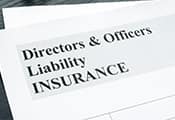D&O Insurance in Bankruptcy
D&O insurance is relevant for all entities and all sizes. Private, public, non-profit, or educational - any organisation with a board of directors or critical people for decision-making can use it to their benefit.
Directors and Officers (D&O) insurance in bankruptcy is crucial for safeguarding the personal assets of individuals serving on a company's board or managerial positions during insolvency proceedings. Key features of this insurance include coverage for legal expenses arising from lawsuits alleging wrongful acts, such as mismanagement or breach of fiduciary duties.
Benefits and Protections for Directors and Officers
D&O insurance in bankruptcy proceedings can play a pivotal role for an organisation in more ways than one. For example, it can safeguard key personnel from bearing legal costs and let them make decisions confidently. D&O insurance also offers indemnification coverage and organisations can also get their defence and settlement costs reimbursed at a fraction of cost (in form of annual premium).
Case Scenario
A director is actively involved in the governance of a thriving technology company. Unfortunately, the company faces unexpected financial challenges, leading to a significant liquidity crisis. Eventually, the company is compelled to file for bankruptcy as it struggles to meet its financial obligations.
In the aftermath of the bankruptcy filing, a major creditor in the case asserts that the board of directors, including the aforementioned director, is responsible for the company's insolvency due to alleged acts, errors, or omissions. The creditor claims that decisions made by the board directly contributed to the financial downfall of the company.
In this case, the director finds himself entangled in legal proceedings, defending against the allegations without the prospect of indemnification from the financially distressed company. Lacking a comprehensive Directors and Officers (D&O) insurance policy, the director is personally responsible for funding his defence and any potential settlement or judgment that may arise from the litigation.
However, had the company prudently invested in a well-structured D&O insurance policy with sufficient coverage limits, the director would likely benefit from the policy's protection. With the D&O insurance intact, the director should receive financial support for legal defense costs and indemnification against covered claims. This would spare the director from the burden of personally financing the legal proceedings and shield his personal assets from being used to cover any resulting financial obligations.
Conclusion
D&O insurance in bankruptcy proceedings is a boon for individuals who take up the role of directors or other critical decision-makers in an organisation. As the business landscape becomes more challenging, D&O insurance is more likely to transcend to become a key principle of fundamental corporate governance. The additional protective layer offers much-needed assurance and paves the way to being innovative and driving changes without the worries of personal liability.


































 Expert advice made easy
Expert advice made easy


